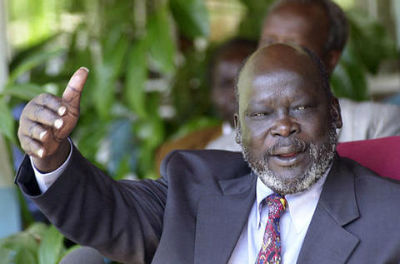 By Salah Shuaib
By Salah Shuaib
July 7, 2013 (SSNA) — When it comes to having charismatic leaders in any of our life aspects, the Sudanese people, unfortunately, are unlucky. Most of those who have governed the country since the eve of independence were, and are, ethically and intellectually unsuited for assuming national posts. The reasons for this pathetic fact are varied, but the intellectuals bear the larger share of responsibility.
If we want to peruse the effect of the Sudanese political contributions and their ability to gain consensus among people, we would find that the result will be an absolute disappointment. Yes, there are some political leaders who made great tangible efforts, but the problem is that they were biased against certain segments of society.
On the other hand, the national figures who have engaged in social, cultural, economic and diplomatic affairs are not far better in assimilating the national sense or convincing the hearts and minds of the Sudanese majority. Subsequently, Sudanese developmental hopes to evolve their givens are not achieved so far.
In fact, Sudan before and after the South Sudan’s independence has been a country that lacks visions, Statesmanship, agreed upon identity, and you can add more if necessary. In such a societal vacuum few leaders tried to initiate ideas that help in addressing the exact causes of the crises we have been facing for decades.
Throughout the last half century Sudan’s political systems have exiled the country’s honest figures because of ideology, race, selfishness, oppression and other motives. Death, as a factor, also, was part of the reasons why we were unlucky to be “presided” by “symbolic national leaders”.
The late John Garang, among those leaders who for different reasons died before we could gain all their great political talents, was a wisdom lover that matters at a time of need. He had convinced the majority of Sudanese by his legacy that brought about freedom for South Sudan people and paved the way for the oppressed and marginalized peoples to keep up the struggle, so that they can prevail and see light at the end of the tunnel.
Halting the political inspiration from continuation, the Garang death deprived Sudan, South Sudan, the region, Africa and elsewhere, from benefiting a lot from his whole inimitable rationality, wisdom and vision. And it might be true to say this: if he had been alive, then Garang could have changed the whole situation in Sudan. But lack of luck is a fate that you cannot confront easily.
It is so sad that Garang’s visions and determination did not find an opportunity to reshape Sudan’s national entity, and then make unity attractive. Now Sudanese are looking, at a moment of disappointment, for new political leaders who understand the importance of the coexistence principles, and the values Garang called for in order to safe Sudan.
Frankly, finding those principled leaders who make history and remain alive for centuries by their prophetic contributions is not an easy task. But still we hope that this generation and the coming one can get the leaders who realize the necessity of confederation, if not reunification, for both Sudan and South Sudan.
The writer is a Sudanese journalist working for Radio Sawa, Washington. He can be reached at [email protected]

